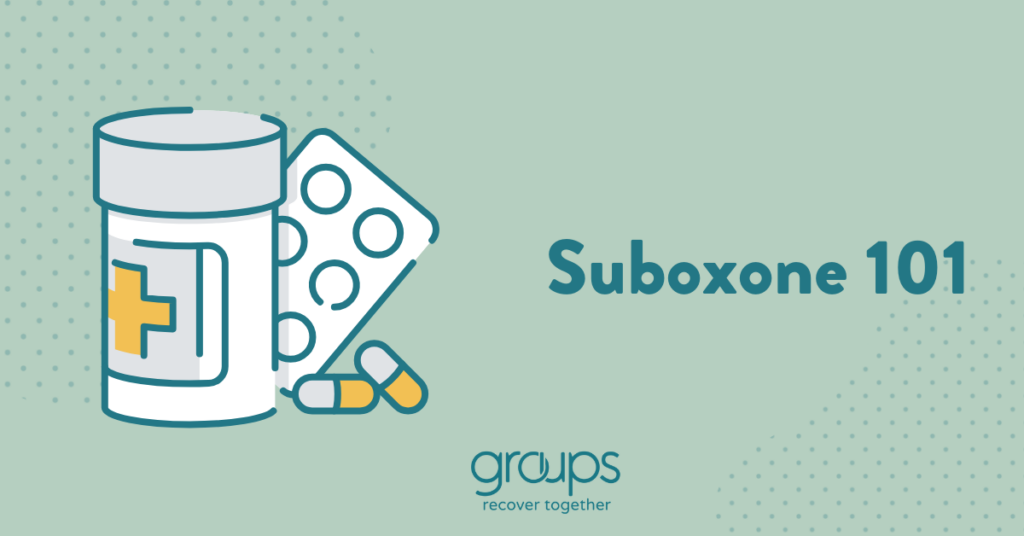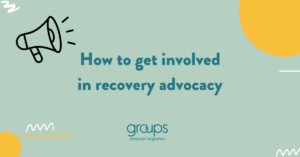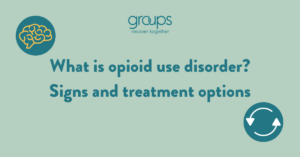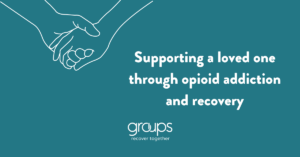Everything you need to know about Suboxone (buprenorphine-naloxone), the “gold standard” medication for opioid use disorder.
Suboxone (buprenorphine-naloxone) is a “gold standard” medication for opioid use disorder (MOUD). Like methadone, it eases withdrawal symptoms and cravings—reducing the dependence on opioids and supporting long-term recovery.
However, Suboxone has fewer side effects and safety concerns than methadone. You can pick it up from a pharmacy instead of requiring a daily clinic visit.
Suboxone is the primary medicine we prescribe at Groups Recover Together. Below, we’re answering common questions about Suboxone to help you determine if it’s the right OUD treatment for you.
What is Suboxone?
Suboxone is the brand name of the medicine buprenorphine-naloxone. It helps people with opioid use disorder (OUD):
- Deal with withdrawal symptoms.
- Stop cravings.
- Have a lower risk of using other opioids.
- Have a lower risk of overdose.
Suboxone decreases the risk of death by overdose by more than half.
How does Suboxone work?
Suboxone is a long-acting partial opioid agonist. That means it binds to and partially activates opioid receptors. Opioid receptors are cell proteins in the brain and central nervous system. They’re involved in pain control, emotion regulation, and other functions.
The effects of long-acting partial opioid agonists are not as strong as full agonists. They also last longer. Methadone, fentanyl, heroin, and pain pills are full agonists. They can make you feel “high.” Suboxone doesn’t make you feel “high.”
What are the side effects of Suboxone?
Common side effects of Suboxone include:
- Body aches, headaches, or flu-like symptoms
- Dizziness
- Trouble going to the bathroom
- Sweating
- Sleep issues
- Nausea, upset stomach, or vomiting
- Anxiety and other mood changes
Most side effects stop after you take the medicine for a while. If they bother you, contact your provider. A dose adjustment may help, and your provider may suggest other medicines or lifestyle changes to help you feel better.
Warning signs
Contact your provider or go to the ER right away if you have:
- A very bad stomach ache
- Vomiting that won’t stop
- Blood in your feces or vomit
- Dark or tea-colored urine
- Light-colored feces
- Yellow eyes
- Yellow skin
- Confusion
Are there any risks to taking Suboxone?
When Suboxone is misused, some people feel a mild “high.” If the medicine is taken as directed, you should not feel “high.”
Some things should be avoided when taking Suboxone. These include:
- Other opioids
- Benzodiazepines
- Other medicines that make you sleepy
- Drinking alcohol
- Driving
- Using heavy machinery
- Other high-risk activities when feeling sleepy
Make sure to store your medicine in a safe place. A small child or pet can die if they ingest Suboxone.
Can you have withdrawal symptoms if you stop taking Suboxone?
Yes. You can have withdrawal symptoms if you suddenly stop taking Suboxone. That’s because your body gets used to it. That doesn’t mean you’re addicted.
Withdrawal symptoms can include:
- Anxiety
- Diarrhea
- Fever
- Sneezing
- Runny nose
- Skin that feels different
- Fast heartbeat
- Tremors
- Shivering
- Sweating
- Sleep issues
Can you take Suboxone while pregnant?
Yes. Leading experts say that Suboxone is safe in pregnancy. For most, taking prescribed Suboxone is much lower risk than misusing drugs.
Suboxone may cause short-term opioid dependence in newborns. Providers can treat this at the hospital. It usually resolves in a few days.
In some states, using any opioids in pregnancy has legal risks. If you get Suboxone at Groups, we’ll help you understand and reduce any risks.
If you get pregnant while taking Suboxone, reach out to your provider. Talk to them before stopping or changing your dose.
What’s the difference between Suboxone and methadone?
Both medicines help with opioid withdrawal and cravings. Suboxone has fewer side effects and safety concerns. It’s also easier to lower the dose over time. Unlike methadone, you don’t have to go to a clinic daily for Suboxone. You can get it from a pharmacy.
Is Suboxone trading one addiction for another?
“What we see [with people on Suboxone] is a complete restoration of life that the person who’s dependent on opiates has been hoping for for a long time,” says Groups founder Dr. Jeff De Flavio. “Even though they’re still physically dependent on a drug … that doesn’t mean that they’re addicted. It means that they’re dependent. While that might just seem like semantics to some of you, when it comes down to a person’s real, lived experience, it is all of the difference in the world.”
“Suboxone is the most effective treatment that we have for drug addiction,” adds Dr. De Flavio. “It’s important to end the stigma and to make sure that everyone who’s struggling with opiate addiction can get access to this important medicine.”

What it’s like to take Suboxone
“Suboxone helped me with my recovery. I used to get up every morning and the first thing on my mind was, how am I going to get high today? Now, I get up every morning, I take my medicine, and I don’t even have to think about it.” — JD, Groups member
“Suboxone has helped me not feel like I need to use anymore. It makes you feel like you can get through the day without thinking about drugs or alcohol. I don’t feel that anymore. It makes me feel clear-headed and not have that thought process of wanting to use. It never hits my mind anymore.” — Johnna, Groups member
“When I took Suboxone, I felt like I was able to function. No sickness, no anxious feelings.” — Ben, Groups member
How can you get Suboxone?
Suboxone can be prescribed online or in person. Health care providers must be licensed to prescribe the medicine.
Groups prescribes Suboxone online or in person in 9 states, with more to come:
- Florida
- Indiana
- Kentucky
- Maine
- New Hampshire
- Tennessee
- Texas
- Virginia
- West Virginia
For a full list of providers near you, check out SAMHSA’s treatment finder.
Suboxone at Groups
Groups Recover Together is a leading OUD treatment provider. Our caring doctors prescribe Suboxone online or in person. This means that you can get treatment when and how it’s comfortable for you.
Groups members meet weekly with peers and trained counselors. They also get support for goals beyond recovery. We can help with housing, health care, food, jobs, school, transit, and more.
Our research shows that Groups members are 2x more likely to survive than those in treatment somewhere else.
We believe that anyone who wants treatment should be able to get it. Groups accepts most insurance and Medicaid plans and can support uninsured folks.
Want to learn more about whether Suboxone at Groups is right for you? Give us a call at (888) 858-1723 any time, day or night.




